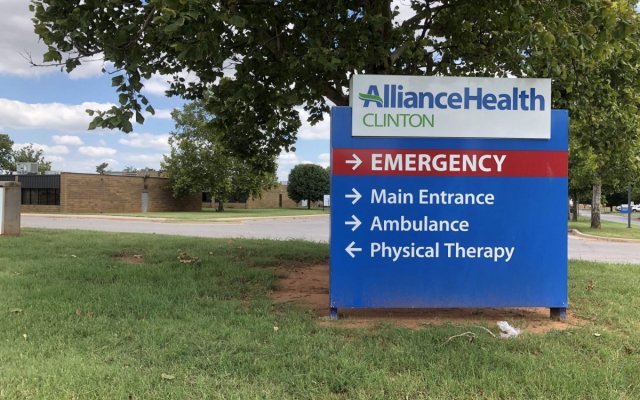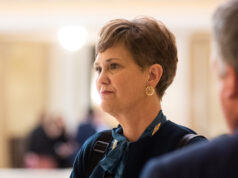
Oklahoma Gov. Kevin Stitt has vetoed SB 1046, a bill that would increase a hospital fee to raise an estimated $134 million to help pay for whichever version of Medicaid expansion is ultimately implemented in the state.
With the Stitt administration previously filing a state plan amendment as well as a waiver to implement what he calls SoonerCare 2.0, his veto strikes down more than 80 percent of the money lawmakers had authorized for Medicaid expansion’s implementation.
In his veto message — relayed to NonDoc by a third party before its official release to media — Stitt referenced the novel coronavirus and Oklahoma’s economic circumstances, which have changed drastically in two months.
“I appreciate the willingness of the Legislature to craft a proposal to fund SoonerCare 2.0. When I announced SoonerCare 2.0, unemployment rates were at 3.2 percent,” Stitt wrote. “Due to the current COVID-19 pandemic and uncertainty within energy markets and commodity prices, unemployment rates are predicted to be as high as 14 percent. This will not only increase the number of individuals currently enrolled in Medicaid, but will also increase the number of potential enrollees in the expanded population.”
Stitt noted that other measures from the Legislature were also needed to fund either SoonerCare 2.0 or the traditional Medicaid expansion proposed in State Question 802, which will go before voters June 30.
“Furthermore, SB 1046 does not fully fund SoonerCare 2.0 in year one. And it does not consider funding for year two,” Stitt wrote. “We must work together to design a health care system that is both affordable and sustainable, and that addresses the unique needs of Oklahoma while improving health outcomes.”
Stitt’s team distributed a press release elaborating on his decision shortly after the publication of this story.
“From day one, I’ve said one-time funds are not the way pay for Medicaid expansion,” Stitt said in the release. “I will always protect the taxpayer, and I will not sign unfunded mandates in the middle of a massive budget deficit.”
‘He asked us for funding for SoonerCare 2.0’
Rep. Marcus McEntire (R-Duncan) said the veto of SB 1046 “creates uncertainty.”
“I’m concerned because State Question 802 is out there. It just seems like what he is creating here is another year of prolonged negotiations with urban and rural hospitals. I was hoping that we had all of this put to bed and agreed upon,” said McEntire, a proponent of expanding Medicaid to cover low-income adults and better reimburse hospitals for treating those who currently lack health insurance. “I understand the governor’s concern with unemployment, but he asked us for funding for SoonerCare 2.0, and the House and Senate funded SoonerCare 2.0 as he requested.”
With SB 1046’s hospital fee providing only an estimated $134 million for Medicaid expansion, the Legislature also sent Stitt SB 1935, which authorizes the transfer of additional dollars for Medicaid expansion in FY 2021 from the Revenue Stabilization Fund. House Appropriations and Budget Chairman Kevin Wallace (R-Wellston) said earlier in May that Oklahoma’s cost for Medicaid expansion cost would be about $164 million. That figure represents 10 percent of the total expense, with the federal government picking up the remaining 90 percent.
Stitt signed SB 1935 today.
“I appreciate the governor’s willingness to talk about the issue more, and we need to get this done,” McEntire said.
Background on the hospital fee
SB 1046 would have increased payments by certain hospitals for Oklahoma’s Supplemental Hospital Offset Payment Program (SHOPP) from 2.5 percent to 4 percent. Under Oklahoma law, critical access hospitals — a federal designation for eligible rural facilities — are exempt from making SHOPP payments to the Oklahoma Health Care Authority, which operates the state’s Medicaid program, also called SoonerCare.
RELATED
Stitt snuffs out medical marijuana program reforms by Tres Savage
According to 2018 numbers, at least 40 rural hospitals in Oklahoma have the critical access designation. State hospitals, federal hospitals, tribal hospitals, specialty hospitals, children’s hospitals and long-term care hospitals are also exempt from making SHOPP payments.
That means the majority of new SHOPP dollars would also be paid by urban and suburban hospitals. Across the United States, hospitals have endured significant financial losses owing to the COVID-19 pandemic, which forced Stitt to prohibit elective surgeries for the end of March and most of April. A May 5 report from the American Hospital Association estimated U.S. hospitals had already lost more than $200 billion in revenue owing to the pandemic, and large hospitals in Oklahoma have laid off staff over the past two months.
SB 1046 advanced from its third reading in the House 54-38 and the Senate 29-17.
(Update: This story was updated at 6:32 p.m. Thursday, May 21, to include additional comment from the governor.)






















